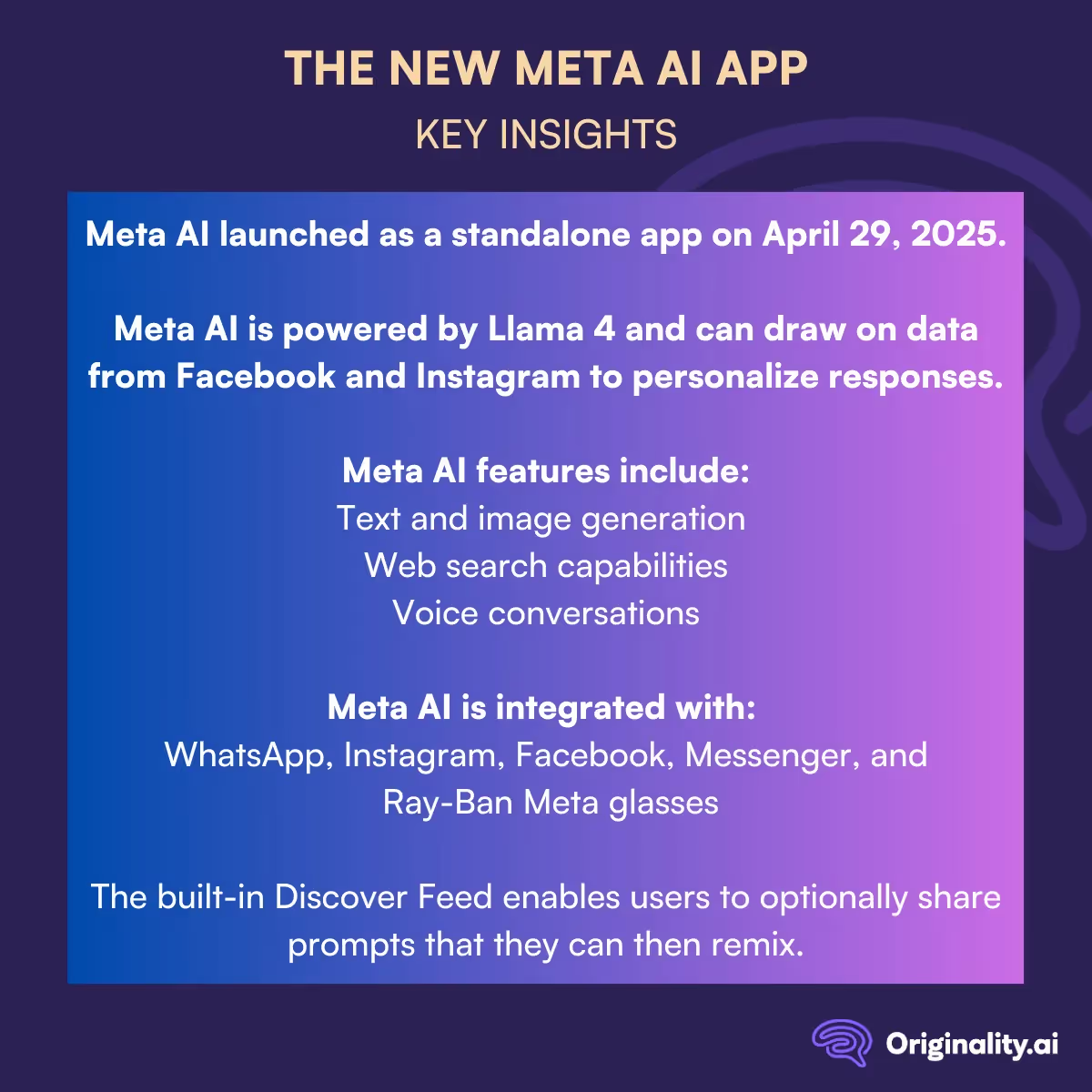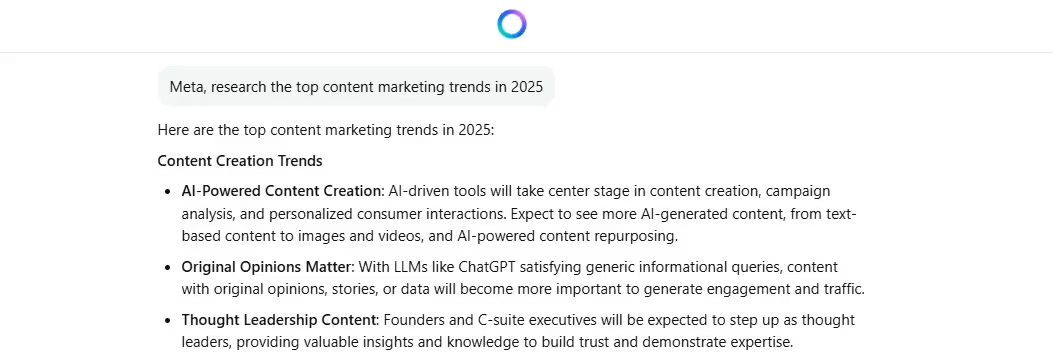
On April 29, 2025, Meta launched the Meta AI app, a standalone AI assistant that delivers personalized, conversational AI to its audience.
Although Meta AI has already been woven into Meta apps like WhatsApp, Instagram, Facebook and Messenger, it has never been a dedicated app before now.
With this dedicated app, Meta’s looking to set itself apart from other AI systems on the market while tapping into its massive social media ecosystem.
While ChatGPT has captured the spotlight for quite some time, it’s clear that Meta is prioritizing AI, from large language models like Llama to generative image creation and voice interaction.
But what does it mean for content professionals? In this article, we’ll dive into key insights about the new Meta AI app!
It's worth noting that as usage of Meta AI picks up, there are newly emerging concerns about the platform, as reported by The Verge.
These concerns range from the fact that Google search is just as convenient to the efficacy of the image generation feature (as it has generated images that it was prompted not to include). Then, there are also questions around content moderation arising, particularly around the social 'Discover Feed' that's built into the app, with prompts for adult content being shared multiple times.
It will be interesting to see how Meta responds to these issues and if the social 'Discover Feed' moderation is impacted.

Maintain transparency in the content you’re publishing in the age of AI with the industry-leading Originality.ai AI Checker.
According to TechCrunch, one of the biggest points that sets Meta AI apart from the competition is that it’s part of Meta’s family of products.
As such, it has the ability to tap into or draw on what you’ve shared on Facebook or Instagram, as noted in the Meta AI launch announcement (learn more about how Meta AI uses data).
Then, over time, it also learns based on past conversations in order to deliver more personal responses.
Meta AI is more than just a text generator. While you can ask Meta AI to generate written content, you can also have it create or edit images. Further, it has the ability to search the web.

We ran a quick test and prompted the tool to “search the web for tips about content marketing.” It then provided a list of tips as well as links to the articles used to source the information.
This is one of the key areas where the Meta AI app stands apart from its competitors.
You can talk to Meta AI in the same way that you’d talk to a person. Just press a button and ask your question.
Meta added a full-duplex voice mode that allows it to have a back-and-forth dialogue. The aim is to create more natural speech than a robotic text-to-speech reader.
Although Meta AI is a standalone app, it isn’t just a standalone app. Meta AI itself is part of a cross-platform system. You’ve likely already seen it at work in WhatsApp, Messenger, Instagram, and Facebook.
It even serves as the AI companion for Ray-Ban Meta glasses, so you could start a conversation on your glasses and keep it going in the app (although this is so far only available in some countries).
One of the more unique features of the Meta AI app is the Discover Feed. This is a built-in social feed where people can share interesting prompts and AI-generated outputs with their friends or the larger community, to see what prompts others are using and even remix prompts.
Currently, the Meta AI app is available for download on both the iOS and Android app stores.
If you use Ray-Ban Meta glasses, the Meta AI app will replace the previous Meta View app
A web-based version is available for desktops and laptops as well, with your conversation history and the discover feed showing in the sidebar.
How does Meta AI compare to ChatGPT? It has similarities with ChatGPT but also differences. Let’s take a closer look.
Right now, Meta is positioning its AI app as an all-purpose AI assistant. That being said, there are applications for content professionals who want to leverage the tool as an extension of their creativity and productivity.
Meta AI can remember context and user preferences, so it makes for an excellent brainstorming partner.
For example, you could say to it, “Hey Meta, I run a travel blog focused on budget tips for backpackers. Let’s brainstorm five video ideas that would appeal to my audience.”
In this example scenario, by incorporating data from your Meta profiles, such as Facebook or Instagram, Meta AI would know you love travel and have posted about certain destinations, and it could potentially create ideas that match these interests.
Then, the Discover feed could also spark new ideas and ways to incorporate creative prompts.
Meta also includes built-in web search, making it a fantastic AI research tool.
Let’s take a look at an example prompt: “Meta, research the top content marketing trends in 2025.”

It will then search the web and give you the answer in the context you asked for, and provide the sources it used.
However, when using generative AI for research applications, it’s important to fact-check, as generative AI can produce AI hallucinations and mistakenly present false information as fact.
Like ChatGPT, Meta AI can draft outlines for blog posts or even create social media captions. You can prompt it with an idea for an outline, then build upon the initial structure of the article or post with unique research, brand voice, and perspectives.
Do you need visual assets? Meta AI can help. It also adds more controls to its image generator (particularly the desktop version) so that you can adjust the style, mood, or lighting of the images you generate. In essence, this gives you fine creative control to get your visuals exactly the way you want.
Last but not least, because Meta AI is available on platforms like Instagram and WhatsApp, content professionals can use it within those apps. The added personalization means it has the potential to help generate responses that are more on-brand for your voice and tone.
The Meta AI app has a number of use cases for content marketing professionals to explore, including web search, image generation, and text generation.
It does share similarities with ChatGPT, however, there are key differences, such as the capability of Meta AI to draw on data from Facebook and Instagram to further personalize responses.
Maintain transparency in the age of AI about the content you’re publishing with the best-in-class Originality.ai AI Checker.
Then, get more insight into the latest in AI:
